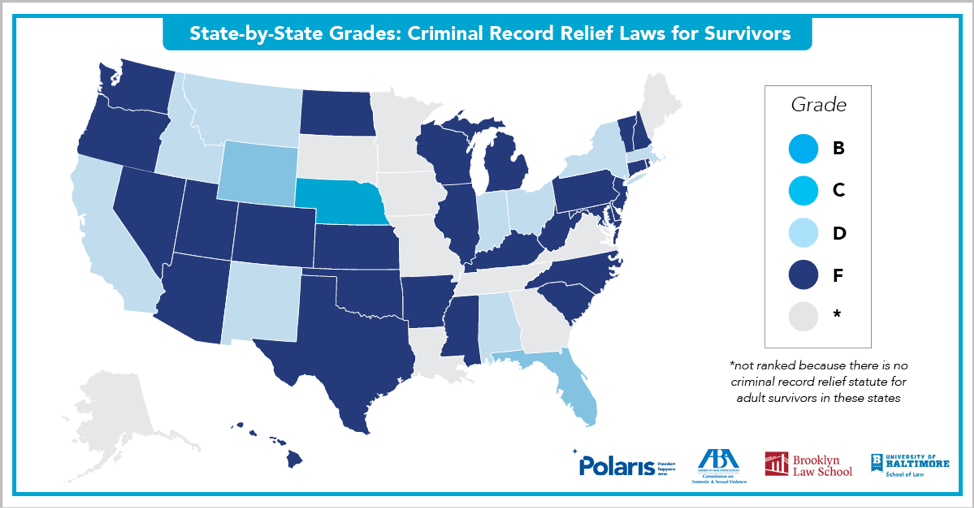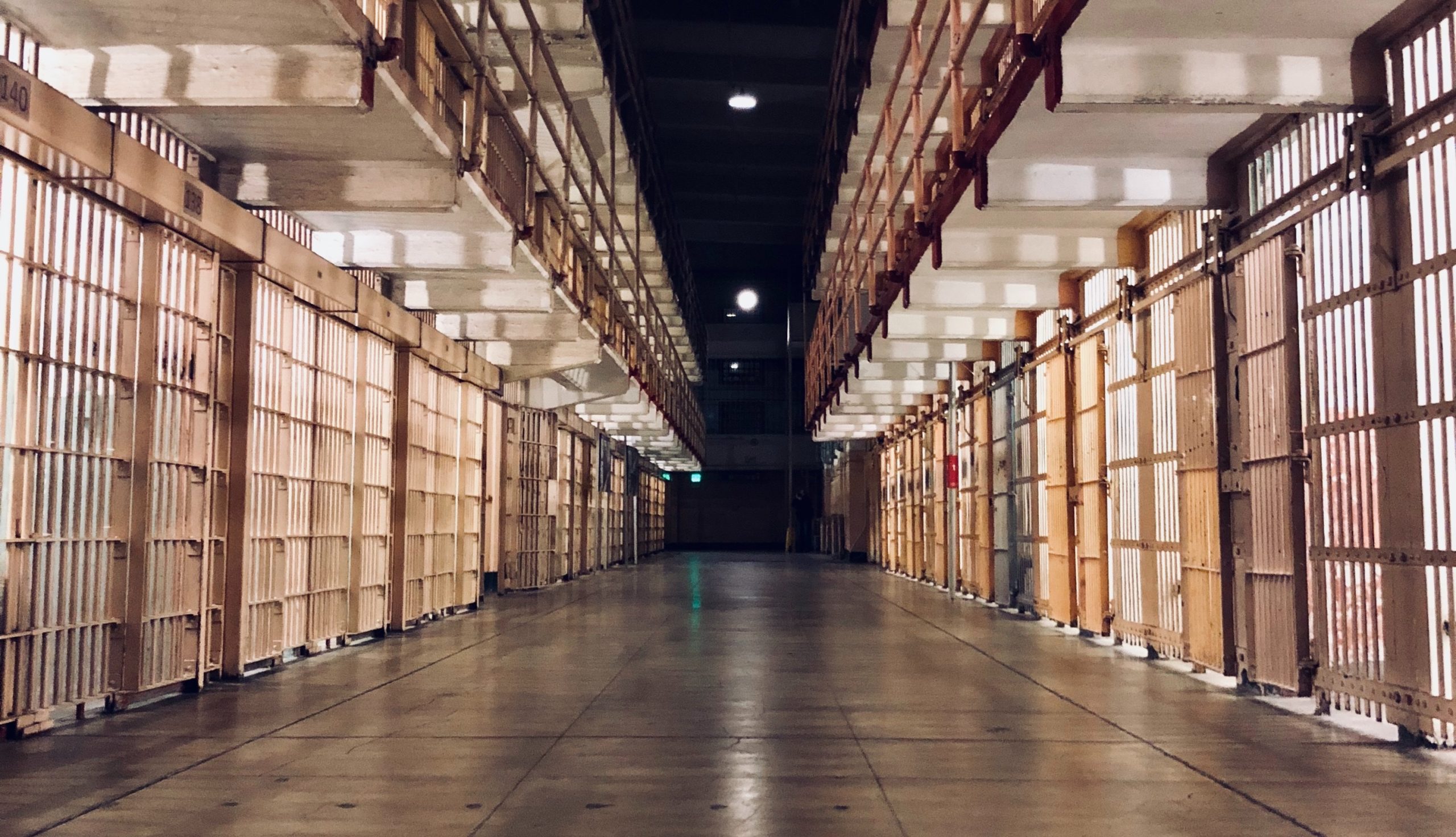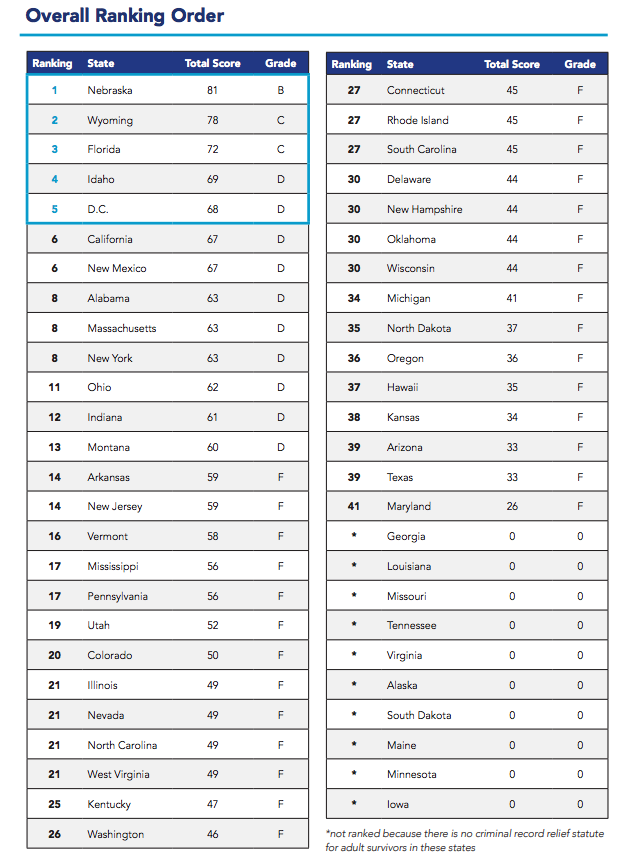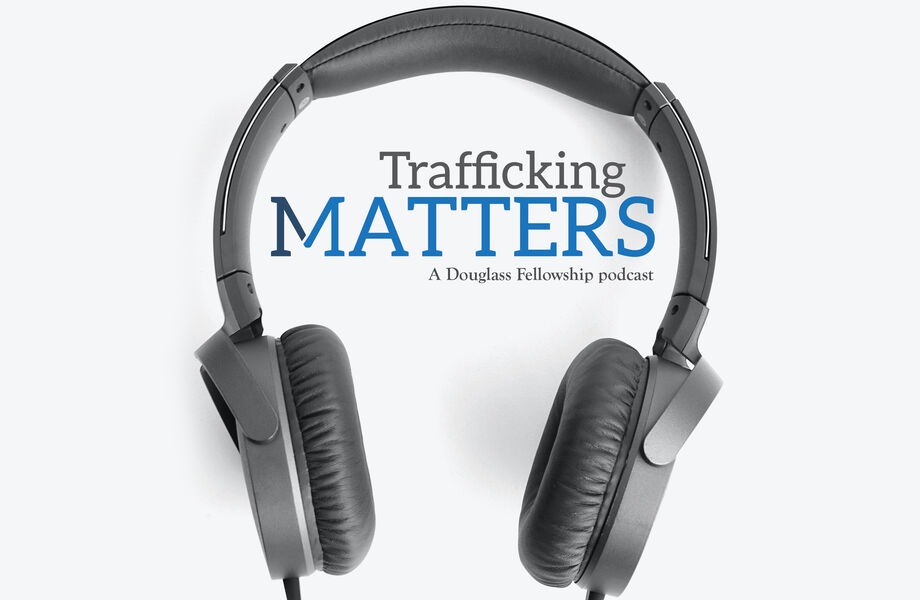By: ERIN MARSH
While many states have taken positive steps toward ensuring survivors of human trafficking can clear criminal convictions from their records, there is still significant room for improvement. Too often, states offer limited record relief for only a small subset of survivors. Some states even neglect to provide a pathway to criminal record relief for any survivors.
This was the top-line finding of State Report Cards: Grading Criminal Record Relief Laws for Survivors of Human Trafficking, a collaboration between Polaris, the Survivor Reentry Project, Brooklyn Law School, and University of Baltimore School of Law.
While there is no nationwide data on the number of trafficking survivors with a criminal record as a result of their victimization, anecdotal evidence and discussions with trafficking survivors have shown that many survivors are frequently arrested, detained, prosecuted, convicted, and in some cases, incarcerated or deported, without ever being identified as a victim of human trafficking by the criminal legal system. In 2016, the National Survivor Network (NSN) conducted a groundbreaking survey on the impact of criminal arrest and detention on survivors of human trafficking. They found that 91 percent of the 130 trafficking survivors surveyed reported having been arrested, and 66 percent of survivors reported that the majority of their arrests happened as a result of their trafficking or while they were trafficked. In fact, 51 percent of respondents reported that all of their arrests were connected to their trafficking.

A criminal record has a profound impact on the ability of any individual to obtain future gainful employment, find affordable and safe housing, begin or continue their education, obtain financial aid for college tuition, or retain custody of their children. A criminal record can also affect an individual’s access to crucial government benefits, such as food stamps, public housing, and cash assistance or welfare. For foreign national survivors, the ability to remain and/or work in the United States depends greatly on their criminal record.
The goal of the Report and Report Cards is to make it easier for states to amend existing laws and enact new ones that truly provide a path for survivors looking to close one chapter in their lives and begin a new one in true, legal freedom.
Grading
The list below includes elements determined by the Report authors to be essential in drafting a criminal records relief statute specifically designed to assist survivors of human trafficking. The criteria for grading and a detailed rubric is available in the Report.
- Confidentiality Protections
- Offenses Covered
- Burden of Proof
- Range of Relief
- Judicial Discretion
- Time Limitations and Wait Times
- Arrests and Adjudications Relief
- Nexus to Trafficking
- Hearing Requirements
- Official Documentation
- Additional Restrictive Conditions on Relief
Only language in the state’s trafficking-specific criminal record relief statute were examined and graded. For example, New York does not include confidentiality protections within the state’s trafficking-specific criminal record relief statute. Although lawyers are able to use protections within other statutes to provide safety for survivors seeking criminal record relief, this would not positively affect New York’s grading because the protection requires outside knowledge from the lawyer, is not guaranteed, and is not designed with survivors in mind. If this provision was included in the trafficking-specific criminal record relief statute, lawyers would have access to a straight-forward set of provisions built to immediately assist survivors as they work to rebuild their lives.
States with a trafficking-specific criminal record relief statute that only applies to minors or states without any trafficking-specific criminal record relief law are given zeros and are not graded or ranked.
Findings

Of the states scored, Nebraska had the highest score – 81 out of 100. Maryland had the lowest at 26. States earning a zero are Georgia, Louisiana, Missouri, and Tennessee – for having trafficking-specific criminal record relief laws that only apply to minors – as well as Alaska, Virginia, South Dakota, Minnesota, Maine, and Iowa, which have no trafficking-specific criminal record relief statutes in place.
Twenty-eight states received an F, and only Nebraska received a B. No state earned an A. This indicates there is much progress to be made on criminal record relief statutes in every state, so the process of clearing records can become easier and less traumatic for trafficking survivors.
According to the NSN 2016 survey, most trafficking survivors who reported going through the criminal record relief process said it was a long, painful, confusing, and expensive process. While it is important to amend and improve each state’s trafficking-specific criminal record relief statute according to the criteria used in the grading process, there are also ways for states and the federal government to expand the relief being provided for trafficking survivors outside the framework of new and amended law, such as making the processes that do exist more accessible for survivors.
Recommendations:
1. Initiate Comprehensive Data Collection Processes
- There is almost no data on the utilization of state criminal record relief laws for trafficking survivors, so it is important that state legislators fund mechanisms to track the usage of criminal record relief laws by survivors.
- Data should be collected regarding how many survivors are attempting to utilize the law, how many are successful in doing so, what kinds of convictions survivors who are attempting to clear their record have, and what kinds of convictions are most likely to actually be cleared.
2. Restore Federal Funding for Criminal Record Relief Legal Advocacy
- In June 2018, the Office for Victims of Crime (OVC) at the U.S. Department of Justice barred future grantmaking that would fund nonprofit organizations to represent trafficking victims trying to clear criminal records.
- The American Bar Association spoke up against this as they acknowledged that the legal community does not have the capacity to address these types of cases in large numbers, and due to this order, fewer organizations will have the financial resources or training on criminal record relief to assist survivors.
- We recommend federal funding for lawyers working on criminal record relief for survivors be restored so more survivors have the ability to access trained lawyers to help them through the process.
3. Implement Provisions for Returns of Fines/Surcharges
- In Nelson v. Colorado, the U.S. Supreme Court held that states are not allowed to retain fines or other surcharges obtained as a result of a criminal conviction that is later vacated or reversed. Therefore, trafficking survivors who have paid fines or fees based on their conviction (e.g. a $250 fine for a prostitution charge) should have that money returned when their conviction is vacated.
- Many survivors, and even lawyers, may be unaware of this right, and every state should add this explicit provision to the criminal record relief statute.
4. Design Trauma-Informed Implementing Regulations
- Even strong laws may have certain practices that prevent survivors from seeking relief. The process can be so exhausting that some survivors have reported it impacted their journey to recovery.
- Examples include requiring payment for each government agency to destroy or seal the survivor’s cleared record or mandating a survivor to appear in person at any hearings – requiring travel, time, and money.
- Nongovernmental organizations and legal aid offices should engage survivor leaders as case managers, peer mentors, and advocates to help guide survivors through the process.
- This requires increased funding commitments from federal, state, and local governments.
5. Allocate State and Local Resources for Outreach and Awareness for Survivors
- In the 2016 NSN survey, many survivors reported they did not go through the criminal record relief process as they did not know about pathways for relief, or if they did know they existed, they did not know how to start the process.
- It is important to allocate resources for targeted outreach and awareness campaigns to ensure the legislation is effective and utilized.
To learn more about criminal record relief or efforts to improve individual state statutes, email [email protected].





